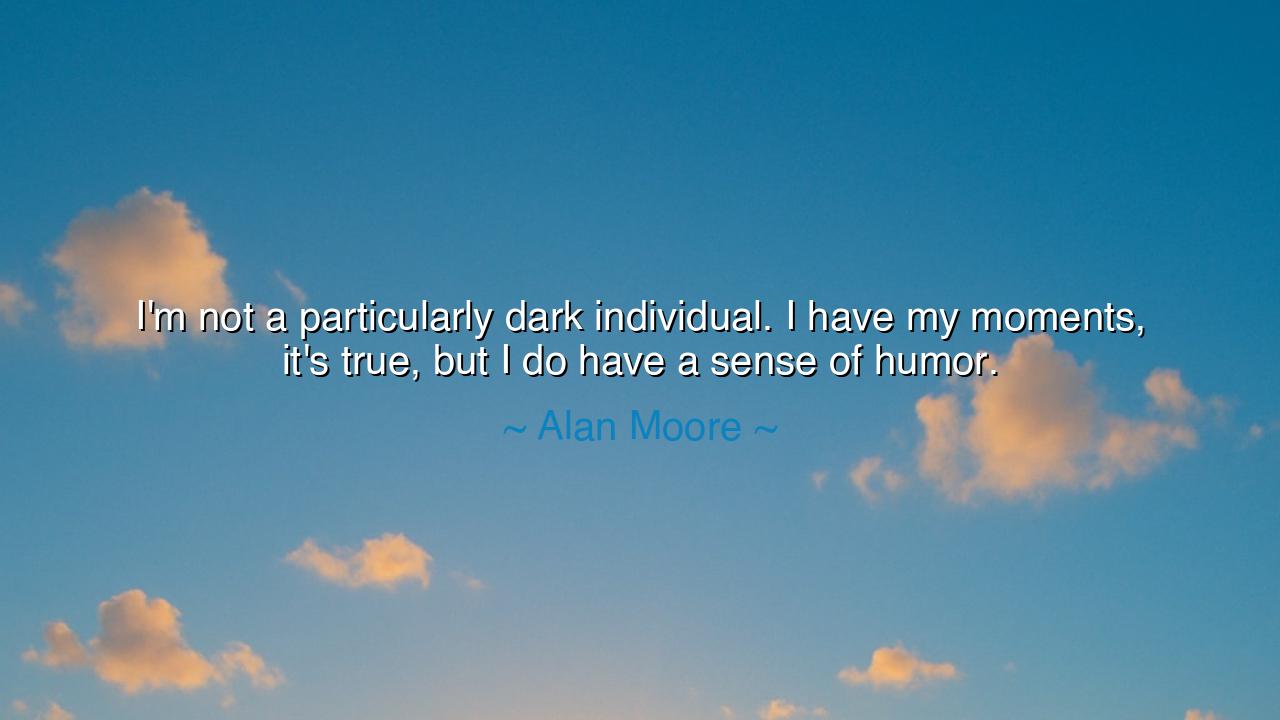
I'm not a particularly dark individual. I have my moments, it's
I'm not a particularly dark individual. I have my moments, it's true, but I do have a sense of humor.






Gather close, O children of wisdom, and listen to the words of one who speaks not of lightness or of gloom, but of the balance that exists within the soul of every human being. In the words of Alan Moore, we find the reflection of a truth that transcends time: "I'm not a particularly dark individual. I have my moments, it's true, but I do have a sense of humor." These words echo with the deep understanding that darkness and light exist not as opposing forces, but as companions that shape the full range of human experience. Moore’s admission is not a claim of innocence or denial, but a recognition of the profound complexity of the human spirit, which is capable of both sorrow and joy, suffering and laughter.
To be human is to walk through the shadows as much as it is to bask in the light. Alan Moore, a man of great intellect and artistry, understands that the journey of the soul is not a straight path, but one of twists and turns, where moments of darkness—those times when the heart feels heavy or the world feels grim—are a natural part of the experience. Yet, as Moore so wisely states, he is not consumed by the darkness, nor does it define him. Instead, he speaks of his sense of humor, that light within that can pierce the darkest of clouds, lifting the spirit and reminding the heart that even in sorrow, there is room for laughter.
In the ancient world, the great philosophers and poets also understood the balance between light and darkness. The philosopher Heraclitus once said, "The road up and the road down are the same." In this, he expressed the profound truth that life is not merely a series of isolated moments of joy or sorrow, but a continuous flow where contradictions coexist. Just as day gives way to night, and night to day, so too do moments of grief coexist with moments of laughter. To embrace one’s humanity is to accept both the shadows and the light, knowing that both are integral parts of the whole. The humor that Moore speaks of is not an escape, but a tool to navigate the complexities of life with resilience.
Consider the great warriors of old, who faced unimaginable hardships and battles that tested their very will to live. In the midst of their trials, they often turned to humor to lighten the burden of their suffering. Odysseus, the great hero of Homer's epic, was not only a man of courage and intelligence but one who, even in the most perilous of situations, found solace in wit and laughter. In one of the darkest moments of his journey, when trapped in the cave of the Cyclops, Odysseus used both his wit and humor to outsmart his captor, turning a seemingly hopeless situation into a victory. In this, we see the power of humor—not as a frivolous pursuit, but as a weapon that can defeat despair and give the soul strength in the darkest of times.
Alan Moore’s acknowledgment of his dark moments reminds us that the human experience is one of constant flux. We all have times when the shadows seem to overwhelm us, when pain, loss, or disappointment seek to dominate our hearts. Yet, the true strength of the spirit is not in avoiding the darkness, but in embracing it without allowing it to define us. Just as the sun sets only to rise again, so too can we endure through the night of the soul, knowing that laughter and light will return in time. Moore’s sense of humor is a testament to the resilience of the spirit—the ability to find joy, even when the heart is weighed down by sorrow.
The lesson, O children of wisdom, is profound and simple: do not fear the darkness, for it is an essential part of who you are. Embrace the full spectrum of human experience, knowing that grief and joy, sorrow and laughter are intertwined, like the threads of a tapestry that forms the whole of your being. When darkness seeks to overtake you, turn to your own sense of humor—that inner light that will guide you through the storm, allowing you to find strength in the face of adversity. Alan Moore teaches us that even in our most difficult moments, we can laugh, and in laughter, we find the courage to continue.
So, as you walk through your days, remember that light and darkness are not opposites, but partners in the dance of life. Let your heart be open to both, knowing that each moment of suffering will give way to joy, and each moment of joy will eventually touch the shadows. Find your humor, for in it lies the strength to endure, to rise above, and to embrace the full, beautiful mess of being human. Laugh, even when the world is heavy, for in doing so, you honor both your light and your darkness, and you give your spirit the resilience it needs to face whatever comes.






AAdministratorAdministrator
Welcome, honored guests. Please leave a comment, we will respond soon